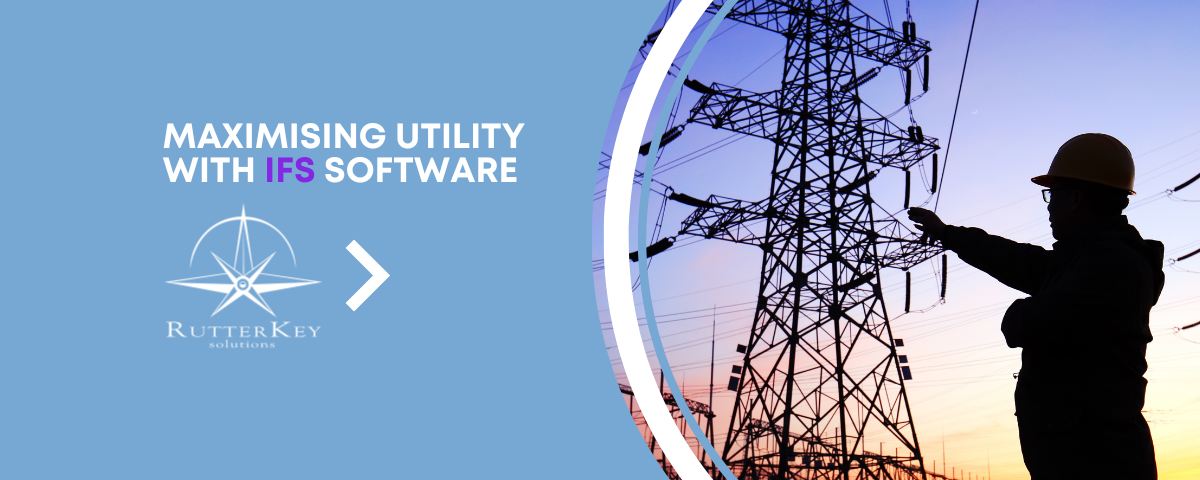
RutterKey @ IFS SAKO 2023
January 30, 2023
Why IFS is the Optimal ERP Choice for Manufacturing Companies
January 31, 2023IFS is a leading provider of enterprise resource planning (ERP) solutions in the utilities sector. With a focus on helping utility companies improve their operational efficiency, IFS provides end-to-end solutions that enable businesses to optimize their processes and operations.
IFS has a suite of solutions tailored to the specific needs of utility companies, including asset management, customer service, and workforce management. IFS also provides innovative solutions for managing billing, customer relations, and cost optimization.
With its cutting-edge technology and industry-leading expertise, IFS helps utility companies achieve their goals and improve their competitive edge. The growing role of software for utility companies.
Utilities companies are increasingly relying on software to improve their operations and customer service. Software is being used to enable more efficient and cost-effective utility management, automate, and streamline customer service processes, improve customer engagement, and enable more reliable energy delivery.
Software is also being used to monitor energy consumption, manage energy assets, and optimize energy resources. Additionally, the software is being used to provide analytics and insights to help utility companies make better decisions.
Finally, the software is being used to provide customers with more detailed information about their energy use and to facilitate the integration of renewable energy sources into their energy mix.
The following list is a breakdown of some of the most specific IFS uses for utility companies. More reasons why utility companies choose IFS can be found here.
4 Specific Uses of IFS Software in the Utilities Sector
1. Automated billing and payment processing
IFS software can be used to streamline billing and payment processing for utility providers. By automating the process, utilities providers can save time and money, while also providing customers with accurate and timely billing information.
2. Asset management
IFS software can be used to manage the assets associated with providing utility services. This includes tracking the performance and maintenance of utility infrastructure, such as power lines, water lines, and gas lines.
3. Customer relationship management
IFS software can help utility providers better manage customer relationships by providing customer service tools and analytics. This helps utility providers better understand their customers’ needs and preferences, enabling them to offer better services.
4. Energy management
IFS software can be used to help utility providers manage their energy usage. This includes tracking and analyzing energy consumption, helping utility providers better understand how their customers are using energy, and providing insights into how they can reduce their energy costs.
4 Benefits of IFS Software in the Utilities Sector
The following list is a breakdown of 4 typical advantages for utility companies using IFS software.
1. Improved asset management
IFS software helps utility companies to better manage their assets and resources. It provides visibility into the entire asset lifecycle, from acquisition and maintenance to retirement and disposal. This helps organizations to better maintain their existing infrastructure and optimize capital investments.
2. Enhanced service delivery
IFS software enables utility companies to offer a better customer experience. It provides the ability to track customer service requests and process them quickly and efficiently. This helps to reduce customer wait times and improve customer satisfaction.
3. Streamlined operational efficiency
IFS software provides utility companies with the ability to automate and streamline operations. This helps to reduce manual labor and increase operational efficiency, which can result in cost savings for a utility company along with improved customer service.
4. Increased security
IFS software provides utilities with the ability to secure their data and control access to information. This helps to protect sensitive data and maintain compliance with industry regulations.
Challenges for IFS in the Utilities Sector
The following list is a breakdown of 4 typical challenges when using IFS software for utility companies.
1. Cost of implementation and maintenance
Implementing IFS software can be costly and require a significant up-front investment. This cost can be further compounded by the ongoing maintenance and support costs that are required to ensure the system is running optimally.
2. Integration challenges
Integrating IFS software into existing systems can be a challenge for utility companies, as it requires a deep understanding of how the various systems interact with each other.
3. Training and user adoption
IFS is a complex system and can require a significant amount of training and user adoption. This can be especially challenging in large organizations with large numbers of users.
4. Data security
IFS software, like all software solutions, can be vulnerable to data security threats due to its complex nature. Utility companies must ensure they have the proper security protocols in place to protect sensitive information.
6 Recommendations for Implementing IFS for a Utilities Organization
The following list is a breakdown of some of the most recommended procedures when implementing IFS software for a utility company.
1. Develop a clear understanding of the current and future business needs of the organization
Before implementing IFS, it is important to clearly understand the current and future needs of the organization. This should include identifying areas where IFS can help, such as reducing costs, increasing efficiency, improving customer service, and providing better access to data.
2. Foster collaboration and communication between departments
To ensure the successful implementation of IFS, it is important to foster collaboration and communication between departments. This includes setting up shared objectives, establishing an effective communication plan, and creating a unified approach to the implementation process.
3. Define the IFS architecture
The IFS architecture should be defined to ensure a smooth implementation. This should include defining the data structure, identifying the software components, and defining the security policies.
4. Choose the right implementation partner
Choosing the right IFS software implementation partner is essential to ensuring a successful implementation of IFS software, especially so in the case of utility companies dealing with services provided to the public. A knowledgeable, experienced implementation partner can help identify and address potential issues before they arise, ensuring a smooth transition to the new software. Get in touch with RutterKey Solutions today to understand more about our IFS expertise in the utilities sector.
5. Train staff
Training staff is essential for successful IFS implementation. This should include providing employees with an understanding of the software and its features, teaching them how to use the software, and helping them understand the benefits of IFS.
6. Monitor and measure performance
After IFS is implemented, it is important to monitor and measure performance. This includes tracking usage, analyzing data, and providing feedback to ensure that IFS is meeting the organization's needs.
If you'd like to find out more about how IFS can be used in the utility sector or how RutterKey can help unlock IFS' full potential in your organization, fill out the form below.




